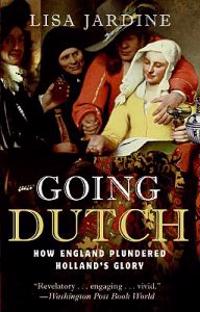Worldly Goods: A New History of the Renaissance (Häftad)
avLisa Jardine, Lisa Jardine
ISBN: 9780393318661 - UTGIVEN: 1998-09In this provocative and wholly absorbing work, Lisa Jardine offers a radical interpretation of the Renaissance, arguing that the creation of culture during that time was inextricably tied to the creation of wealth that the expansion of commerce spurred the expansion of thought. As Jardine boldly sta[...]
The Awful End Of Prince William The Silent (Pocket)
avLisa Jardine
ISBN: 9780007192588 - UTGIVEN: 2006-06-19Provides an account of the assassination in 1584 of Prince William of Orange, and the shockwaves it sent through an age. This book explores an eclectic mix of history's tipping points. It presents the historical ramifications of just such an instance, the first assassination of a head of state with [...]
Going Dutch (Inbunden)
avLisa Jardine
ISBN: 9780007197323 - UTGIVEN: 2008-04-01A fascinating exploration of the relationship of competition and assimilation between England and the Netherlands during the 17th century, revealing how Dutch tolerance, resilience and commercial acumen effectively conquered England by permanently reshaping the intellectual landscape long before Dut[...]
Going Dutch (Pocket)
avLisa Jardine
ISBN: 9780007197347 - UTGIVEN: 2009-02-19A fascinating exploration of the relationship of competition and assimilation between the Netherlands and England during the 17th century, revealing the ways in which Dutch tolerance, resilience and commercial acumen effectively conquered Britain by reshaping its intellectual landscape, long before [...]
Going Dutch: How England Plundered Holland's Glory (Häftad)
avLisa Jardine
ISBN: 9780060774097 - UTGIVEN: 2009-09On November 5, 1688, William of Orange, Protestant ruler of the Dutch Republic, landed at Torbay in Devon with a force of twenty thousand men. Five months later, William and his wife, Mary, were jointly crowned king and queen after forcing James II to abdicate. Yet why has history recorded this bloo[...]
Ingenious Pursuits: Building the Scientific Revolution (Häftad)
avLisa Jardine
ISBN: 9780385720014 - UTGIVEN: 2000-12In this fascinating look at the European scientific advances of the seventeenth and early eighteenth centuries, historian Lisa Jardine demonstrates that the pursuit of knowledge occurs not in isolation, but rather in the lively interplay and frequently cutthroat competition between creative minds. <[...]
Erasmus, Man of Letters (Pocket)
avLisa Jardine
ISBN: 9780691165691 - UTGIVEN: 2015-06The name Erasmus of Rotterdam conjures up a golden age of scholarly integrity and the disinterested pursuit of knowledge, when learning could command public admiration without the need for authorial self-promotion. Lisa Jardine, however, shows that Erasmus self-consciously created his own reputation[...]










